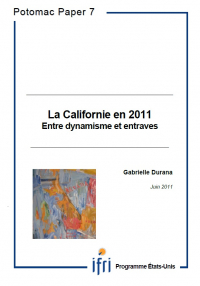La Californie en 2011 : entre dynamisme et entraves Potomac Paper, No. 7, June 2011
California enjoys a strong economy, backed by a strong immigration. Traditionally, this strength was reinforced by consistent investments from Sacramento, allowing for infrastructure development and education policies. In past decades, however, the idea that the state should do less has taken hold. Reforms have brought about a constant tightening of the state budget and public services. The less affluent citizens are left aside and the "social contract" of the Golden state is imperiled.

California has long benefited from a very positive image, perhaps due to its sunny beaches, the Hollywood celebrities, or more generally its frontier spirit. But beyond these subjective factors, there is also measurable success and innovation in California, where information and now green technologies thrive in Silicon Valley.
The Golden State, once a hub for pioneers and adventurers, remains an attractive destination for immigrants. Since the 1990s, ethnic minorities have represented more than half of the population, among them both unskilled workers and expert engineers. Within California's culture of openness and tolerance, new arrivals tend to be rather well accepted, with diversity regarded as cause for celebration.
Until the 1970s, Sacramento levied relatively high taxes, allowing for strong policies of infrastructure development and effectively reinforcing a unifying Californian social project. However, reforms in recent decades have led to structural problems within the state. It seems a shift has occurred, with trust in public institutions falling, and the social contract of California inching closer to disrepair. The elements of this change are twofold:
First, a refusal to pay high taxes and the establishment of rigid budgetary rules slowly drain California's public services and have brought about a recurrent deficit, a deficit hitting hardest those with lowest income and compounded by a strict and costly security policy jailing multi-offenders.
Second, the politics of the state have become increasingly dysfunctional. A series of reforms has polarized politicians along partisan lines, the regular uses of referendum is bringing populism forward, and even with the minority majority, the affluent and white overwhelmingly dominate voters' registration and turnout.
Remarkably, California's growth is able to continue today despite America's recession. Its structural problems are not helping, however, and they may be straining the limits of social cohesion within the state. Even so, there is a chance these problems will be addressed: the election of Democratic governor Jerry Brown may herald coming reform.
This content is available in French : La Californie en 2011: entre dynamisme et entraves


